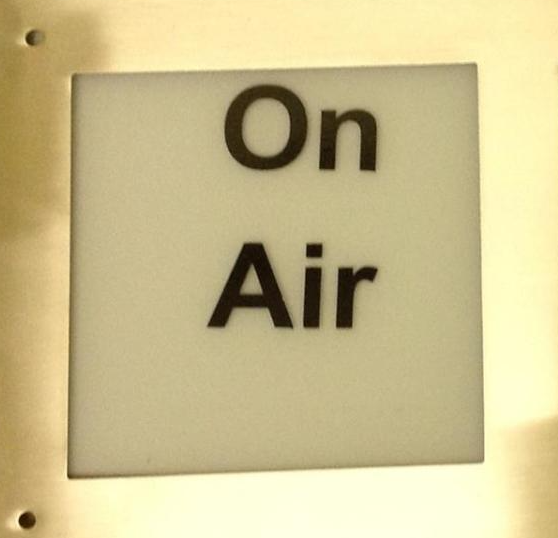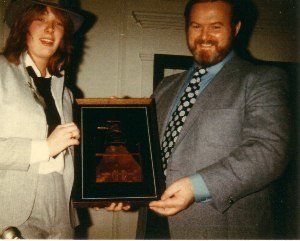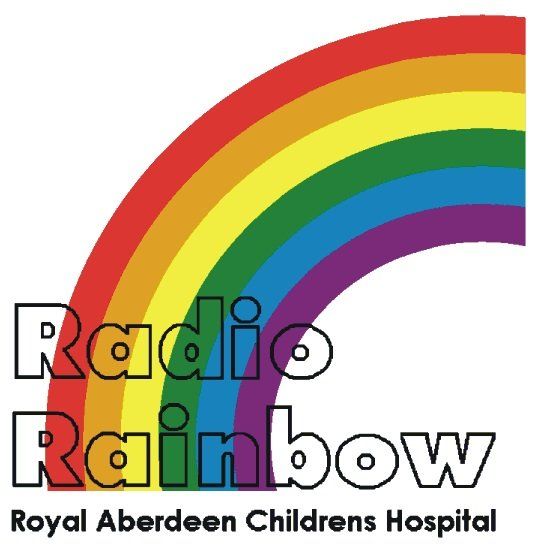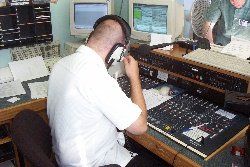History
1950's
The history of hospital broadcasting in Aberdeen began in the 1950s when the Aberdeen Hospital Radio Association was set up to convey football commentary from Pittodrie to the hospitals of Aberdeen.
This was the brainchild of Ernie Buchan, a local businessman who as well as hiring PA equipment, also owned a small studio in Belmont Street.
On Sunday mornings, AHRA would also present the request show. All shows were broadcast by BT landline and AHRA continued to offer coverage of all AFC first and reserve teams until 1999.
1980
From the original studio in the basement of the Nurses Home, made available in February of 1980 by the hospital authorities, plans were drawn up for the formation of a new hospital radio service and Grampian Hospital Radio (GHR) was conceived.
This was all that was on offer until a group came together with the intention of offering a more fully-fledged hospital radio service. This group represented several local groups, consisting of students, DJs and the church.
Their first meeting was held at Inn at the Park in 1980 and following this, an approach was made to the Local Health Authorities who were highly receptive to the idea.
The group were handed a former and disused nurses sitting room for development into their studios and the station remained there we moved to our premises in Westburn Cottage.
1981
The construction of the studio followed and fund raising began with a will and determination as equipment had to be bought and installed. Grampian Hospital Radio was officially opened by television personality Donnie B. MacLeod on the 10th of January and a few days later, on January 14th 1981, the first programmes were transmitted
Early members included Aberdeen businessman Finlay Cran, Bruce Kennedy (who continued to be actively involved with the station long after his association with Northsound) and the first chairman of the organisation, Keith Fraser.
The first record played on the newly christened Grampian Hospital Radio was The Continental by Maureen McGovern, chosen for its introduction featuring the sound of corks popping.
The station broadcast from 7pm until 10pm, 7 days a week, although volunteer availability saw programming gradually increase at the weekends.
Very early in the station’s development, one member, John Innes, was particularly keen that Saturday broadcasting should incorporate a level of sports coverage. John became the real driving force behind the sports show, known as, "SportsMix". Originally, the Sportsmix would be hosted by team of as many as 4 or 5 presenters, and John would spend a considerable amount of time preparing scripts, tapes and much more "behind the scenes" to ensure the shows success. SportsMix can still be heard on GHR to this day.
However, any sports programming had to accommodate the Aberdeen Hospital Radio Association which was still offering coverage of all first and reserve team matches involving Aberdeen Football Club.
For this reason, SportsMix broadcast from 1pm until 2:50 and returned after the match from 4:50 until 5:30 to offer a scores round up and post match discussion. As a result of this, and due largely to the technology available at the time, a "Priority Order" developed for use of the landlines. Bottom of this list was Radio 2, with GHR in third place, Aberdeen Hospital Radios Relay was second and top priority was given to the hospital Chaplain.
Switching from Radio 2 to GHR was by means of a key whereas it was the engineers in the switch room who controlled the change over to AHRA.
It should be said, though, that this change would only take place when the hospital engineers were conveniently next passing the switch room, resulting in some rather sudden changes of programme!
Sunday was largely used, at this time, as a day for training new volunteers and recording features for use throughout the shows. Again, volunteer availability has seen this rise dramatically.
1984-1989
Between 1984 and 1989, the organisation was chaired by Ian McKessock, and it was he who set the foundations for the workings of his new committee, a model that continues to this day.
Ian still talks very positively of this strong and dynamic group and much happened during his time at the helm. As a voluntary organisation with full charitable status, GHR relies entirely on donations to operate.
The station therefore adopted a much higher profile during this time as Ian and his committee would regularly organise flag days and the station was always represented in the annual Bon-Accord parade.
Perhaps the dedication and commitment of the volunteers at this time is best summarised by the example of Doreen Jeffrey. Doreen worked tirelessly to represent GHR in the hospital wards and is remembered for her work on Christmas Day when she would come in and work with the patients for whom geography would have meant an otherwise lack of visitors. Her efforts were rewarded when she was nominated for a prestigious BT Award.
1990's
Bill Barclay was in the chair for 2 years during the early 1990s and was the driving force behind Radio Rainbow.
Bill would approach possible sources of funding in his own inimitable style and secured a donation of £25,000 from the ITV Telethon making GHR the largest individual recipient that particular year. To receive the cheque, Bill, alongside previous Chairmen Doug Leith and Ian McKessock were invited to attend a formal reception.
Picture: Iain McKessock behind the Mic with Gordon Bathgate looking on
1992 Radio Rainbow
It had always been the intention of the committee of GHR to set up a specialist children’s service and this money was a major step in making that happen.
A competition was held in conjunction with the local press to choose the name of this new station with the first prize, again secured by Bill, of a trip in a helicopter. A panel consisting of representatives from GHR and the Royal Aberdeen Children’s Hospital would choose the winning entry. The final 2 entries were, "Rainbow" and "Sunshine" with Rainbow eventually winning, reflecting as it did the sentiments of the station and conveying aspirations of hope.
Radio Rainbow first went on the air on 5th August 1992. Bringing Radio Rainbow to the air was undoubtedly a major milestone for hospital broadcasting in Aberdeen, however, attempts to mark the openings of Rainbow did not share in this success! On our first day of broadcasting, Bill Barclay slept in and missed his chance to be the first voice heard on the station (Andy Adam dutifully stood in!) and just prior to going on air to present the "official opening", Stuart Wood, the then youngest member of the organisation, took rather "cold feet" and Ian McKessock hurriedly stepped in with no script prepared!
The official opening of Radio Rainbow was celebrated with a small party for the children of the hospital. After this, Bryan Broomfield, who was head of the then Aberdeen Royal Hospitals Trust, officially declared the studios open at 2:30pm and Ian, standing in for Stuart, played "Somewhere Over The Rainbow". Graham Stephen hosted the first show of the day, before Ian returned with his scheduled broadcast.
1992-2003
The original Rainbow studio sat just opposite the old mailroom in RACH and in 1995 they moved to a newer studio. Radio Rainbow broadcast on 9:45AM from our opening in 1992 until December 2003.
The next major events for GHR were the Restricted Service Licences (RSLs) meaning GHR could be heard outside of the hospitals for the first time in its history. Pat Ramsdale was in the chair at this time and there were 3 RSL broadcasts, the first on an AM frequency and the latter 2 were both presented on FM.
The first was a great success, covering the visit of the Tall Ships Race to Aberdeen and really, more than any other event, brought the membership together as a team. Presented from the Bay of Nigg in a large trailer with an OB Unit and a stage, members hosted shows, whilst outside contractors saw to the technical side of things. Three of the presenters, namely Kenny Carle, David Fawkes and Neil Fraser slept each night in the trailer so as not to miss their early morning shows at 6am. The shows were relayed to the hospitals via an aerial on the top of Ashgrove house and broadcast for 4 days. Coverage of the Tall Ships Race itself involved Allan Ramsdale watching events with his binoculars and James Allan presented a 30-minute commentary of the fireworks display.
The next RSL, our first on FM, was presented in conjunction with the 50th anniversary of Aberdeen Royal Infirmary. Again the trailer was used (although no-one slept in it this time!) as we presented an OB from the Duthie Park.
The third RSL and second on FM was from linked to the World's Strongest Man Championship and was to coincide with an OB from Seaton Park in Aberdeen. This was not a success by any means as many things went drastically wrong. Firstly, it was felt that Seaton Park is not as popular as Aberdeen’s other parks, and the timing was also unfortunate as North Sound switched their OB from Duthie Park, scheduled for the following day, to coincide with ours. As a result of these unfortunate and unforeseen circumstances, GHR went through some difficult financial times.
Former Volunteers
Mike Cook - Northsound Radio
Craig Lumsden - Original 106 & Kingdom FM
Gary Stein - Bauer Media
Paul Harper
Chris Thomson - Northsound Radio
Dave McDermid - Northsound & Aberdeen FC
David Bennett - Grampian TV
Rich Preston - BBC World TV & Radio
Kennedy Thomson - Grampian TV
Derek Rae - BBC Radio Scotland
Richard Gordon - BBC
Rick Cowie - Northsound Two
Doreen Wood - BBC Aberdeen
Martyn Smith - Original 106 & Kingdom FM



















